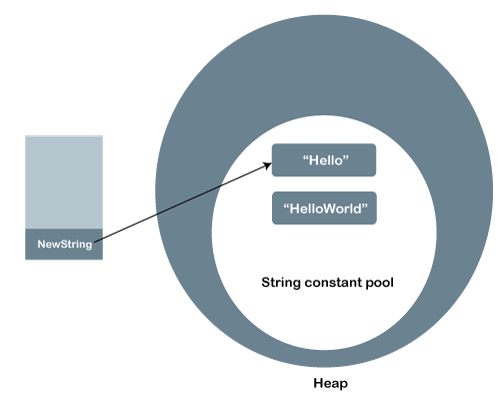Why Are Strings Immutable in Java? Comprehending the Core Concepts
Why Are Strings Immutable in Java? Comprehending the Core Concepts
Blog Article
What Is Unalterable Strings and Just How It Functions
In the world of shows, recognizing the concept of unalterable strings is extremely important for developing robust and secure applications. Immutable strings refer to strings that can not be altered after they are created, guaranteeing information honesty and predictability within the code.
The Basics of Unalterable Strings
Unalterable strings, as an essential idea in programs, are character sequences that can not be altered as soon as they are created. This means that when a string is designated a worth, that worth can not be changed. In languages like Python and Java, strings are unalterable items, resulting in various effects in regards to memory management and information integrity.
One of the vital benefits of immutable strings is that they supply a complacency in data control. Because the web content of an unalterable string can not be changed, it makes certain that the initial information remains intact, lowering the risk of unintentional adjustments during program execution (Why are strings immutable in Java?). This home also simplifies debugging procedures, as developers can rely on that as soon as a string is defined, its worth will certainly not be inadvertently altered
Additionally, immutable strings facilitate reliable memory use. When a brand-new string is developed based on an existing one, as opposed to changing the original string, the brand-new worth is saved separately. This technique improves performance by decreasing memory fragmentation and streamlining memory allotment procedures. Overall, recognizing the basics of unalterable strings is vital for grasping programs principles and enhancing code efficiency.
Advantages of Unalterable Strings
Building upon the protection and effectiveness benefits of unalterable strings, their benefits include improving code integrity and streamlining concurrent shows jobs. By being unalterable, strings can not be customized after production, which removes the danger of unplanned adjustments in the information they save. This intrinsic immutability ensures that as soon as a string is created, its value remains constant throughout the program's execution, lowering the possibilities of bugs brought on by unexpected alterations.
Additionally, unalterable strings add to code reliability by making it easier to reason about the state of a program. Because strings can not be transformed, programmers can rely on that a string will certainly constantly hold the exact same value, simplifying debugging and upkeep initiatives. This predictability results in more secure and reliable codebases.

Execution in Programming Languages
Within different programs languages, the unification of immutable strings is an essential element that impacts exactly how information is taken care of and controlled within code frameworks. The implementation of unalterable strings differs across various programs languages, with each language providing its very own mechanisms to sustain this idea.

In comparison, languages like C and C++ do not look these up have built-in assistance for immutable strings. Developers in these languages need to manually execute immutability by applying policies within their code to stop straight alterations to string objects.
Finest Practices for Collaborating With Unalterable Strings
When dealing with immutable strings in shows languages like Java and Python, sticking to finest techniques guarantees protected and effective information adjustment. One of the key ideal techniques is to utilize StringBuilder or StringBuffer rather than directly adjusting strings, particularly when taking care of substantial concatenation operations. These courses offer mutable options for string manipulation, aiding to stay clear of unneeded memory appropriations and boosting efficiency.
In addition, when working with delicate data such as passwords or API secrets, it is essential to stay clear of storing from this source them as plain message in immutable strings. Utilizing secure storage space devices like char ranges or specialized libraries for handling sensitive details aids mitigate safety dangers linked with unalterable strings.
Real-world Applications and Examples
Exploring functional implementations of unalterable strings in different sectors exposes their substantial impact on information integrity and system dependability. In the health care industry, unalterable strings play a crucial role in making certain the security and confidentiality of client information. By avoiding unapproved alterations to sensitive information such as clinical documents and prescriptions, immutable strings aid maintain conformity with strict personal privacy laws like HIPAA.
Monetary establishments additionally take advantage of the unalterable nature of strings to enhance the safety and security of client data and purchase records. Immutable strings help avoid fraud and unapproved modifications to economic info, offering a durable protection versus cyber risks and guaranteeing the trust and confidence my latest blog post of clients.

Verdict
In conclusion, immutable strings are fixed and stable sequences of personalities that provide advantages such as thread security and boosted performance in programming. They are implemented in various programs languages to make sure information honesty and security. Finest practices for dealing with immutable strings include avoiding direct adjustments and making use of techniques that return brand-new string things. Real-world applications of unalterable strings include data encryption, caching, and string adjustment tasks.
Unalterable strings refer to strings that can not be changed after they are developed, making certain data integrity and predictability within the code. When a new string is developed based on an existing one, rather than modifying the initial string, the new worth is saved separately.In languages like Java and Python, strings are unalterable by default, meaning that as soon as a string item is developed, its worth can not be altered - Why are strings immutable in Java?. Best practices for working with unalterable strings include preventing direct modifications and utilizing methods that return new string items. Real-world applications of immutable strings consist of data file encryption, caching, and string adjustment tasks
Report this page